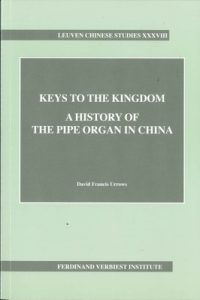About the Project
Welcome to The Pipe Organ in China Project (中國管風琴研究計劃) Website .
The Project was established in 1989 by Prof. David Francis Urrows at Hong Kong Baptist University. This website now continues the work of the Project, in particular curating and updating the Project’s Census of pipe organs in China.
All of the pipe organs included in the Appendix to Keys to the Kingdom: A History of the Pipe Organ in China (2017) are reported on this website. Additions to the Census found on this site are of three types:
- new installations not covered in Keys to the Kingdom
- newly-reported pipe organs which were not known to the Project at the time of publication
- emendations to the Census or data based on new information
The What’s New page reports on these types of new data or information as they come in. A monthly update to the Website is generally published at the end of each month. We also post commentaries in blog form from the Project from time to time, and a running list of errata in Keys to the Kingdom is also available there.
In addition, the site provides links to the websites of organ builders who have built, or are currently installing new pipe organs in China. Links are also provided to other websites, especially those dealing with organs in the ASPAC region, which may be of interest to visitors to this site.
An English-Chinese Glossary of Pipe Organ Terminology is available by clicking this link: glossary. This list is an ongoing project, and will be updated from time to time.
Searching the Census
The organs included on this site are searchable by either location, or by chronology/date (generally the year of construction.) Understanding the Census ID is important to making full use of the site.
The Census ID consists of a three-letter acronym of the location + the year of construction (or, if this is not known, the date of installation, or of first documentary report, or an estimated terminus post quem.)
Example: PEK1888 means: Peking (PEK, i.e. Beijing) and 1888 construction and/or installation.
(Note that while the text of this site (as well as that of Keys to the Kingdom) generally refers to geographical locations in Mainland China by using the current pinyin forms for Mandarin Chinese, the Census bases the ID acronym on the older, more commonly-recognized English forms.)
The site welcomes contributions to the research from anyone with relevant information to share. Please use the Contact Us page for this purpose or send an email to calcant@organcn.org. Please understand that the Project cannot perform research for other parties, or engage in discussions that lie outside of verification of reported data.
On the FAQ page, we have posted answers to relevant questions we have received, or that we anticipate receiving, and this will be updated as the site expands. Information can also be found here about purchasing Keys to the Kingdom, published by the Ferdinand Verbiest Institute at the Catholic University of Leuven, Belgium.
